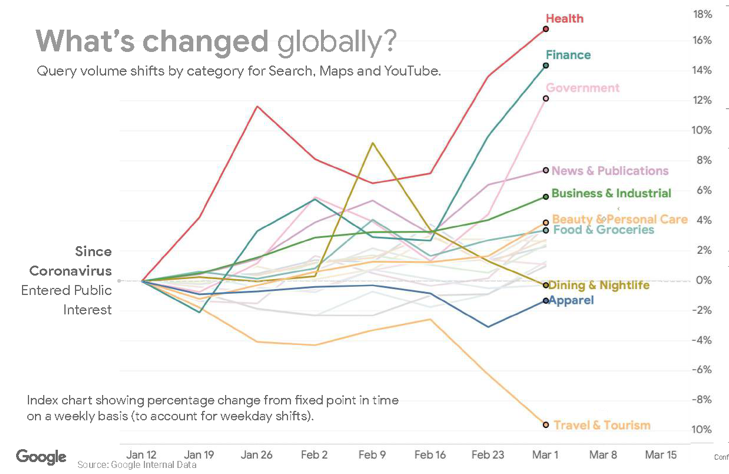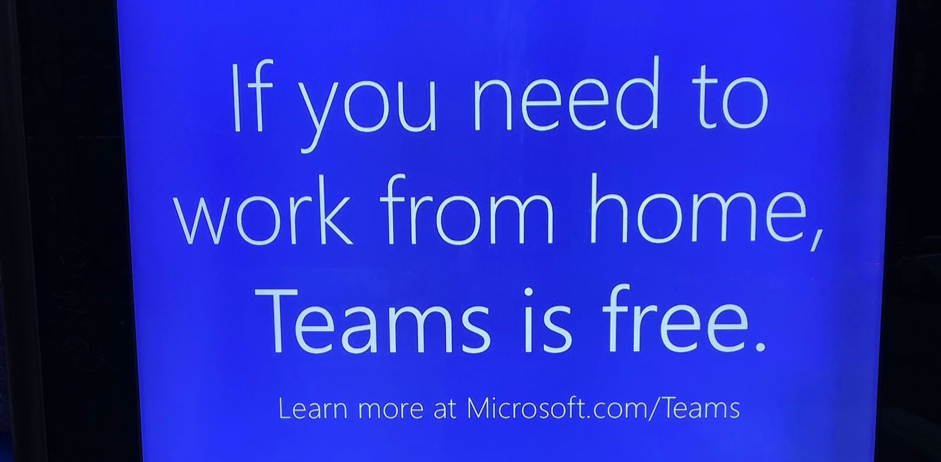When Sequoia Capital called coronavirus the Black Swan event of 2020, few foresaw the swiftness with which the hedge fund’s early March prediction would unfold across the United States. Two weeks later, in the face of a global pandemic, many Americans have radically shifted their behaviors to “flatten the curve” and, sometimes reluctantly, adopted social distancing as a new way of life.
With the cancelation or postponement of all in-person conferences, cultural events, sports and schools, and with most offices shuttered, the marketing community faces a stark new reality and a profound question – how do you market to a world that has effectively closed shop?
Throw out all of those early 2020 marketing predictions, because COVID-19 has fundamentally reshaped not only this year’s outlook but has become a tipping point for how people will model and conduct business.

Nobody Moves, Nobody Gets Hurt: The precipitous drop in travel and tourism has coincided with a sharp rise in terms focused on health, finance and government since the coronavirus surfaced in a building or gymnasium near you.
Promote Touchless Service
Due to the heightened importance of hygienic, touch-free interactions, a new era of touchless delivery services, drive-thru-only businesses, and check-out-free grocery stores seems inevitable. It’s the new customer journey – service without a side of germs, please. In this current environment of extreme viral vigilance, these newer service models arguably offer the safest way to enjoy life or run a business, while re-enforcing social distancing practices.
Nimbler upstarts like DoorDash and GrubHub, and video teleconferencing companies like Zoom, have embraced the moment with thoughtful marketing by promoting services that reduce traditional human clusters. Starbucks, McDonald’s and others shifted gears to drive-thru only service, while simultaneously using their marketing channels to message increased cleanliness standards. AmazonGO’s touchless check-out technology will soon be available for other businesses and should bode well for the future of touchless grocery shopping and perhaps even for sit-down dining – with customers properly spaced apart from others, of course.

Marketing in Touchless Times: Through the end of April, independent restaurants can sign up for free with DoorDash and Caviar and pay zero commissions for 30 days. GrubHub is similarly deferring commissions for independent restaurants.
Embrace Telecommuting
For the next few weeks, your new office will include children, a spouse, and probably a cat or dog for good measure. Each living area will be re-cast to serve the educational or business needs of individual family members. Unfortunately, while you are practicing social distancing, there will be no other diversions besides streaming content, bad news and people banging on pots and pans outside of your apartment to make “music”.

Have Teams, Don’t Travel: Like professional athletes who can unintentionally become Super Spreaders, white-collar professionals have been grounded in place to prevent similar outbreaks.
“A lot of people are talking about this as a massive work-from-home experiment, but really it’s more of an inflection point,” wrote Ben Hamley, Future of Work Lead for JLL Asia Pacific, in a February blog post. “While the idea of flexible work has been bandied around frequently and implemented in some firms, especially in tech companies and start-ups, the Coronavirus forced many industries in Asia to begin this exercise en masse.”
For companies resistant to change, however, bad PR awaits.
Adjust to Content Stasis
Sequoia Capital’s Black Swan thesis suggested cutting back on everything now and prepping your business contingency plans for an impending market crash. But it’s not like you really had a choice, as it all happened so fast. With films and tv crews pausing most production work and only virtual events left to attend or report on, there will be a decrease in the volume of marketing and entertainment content produced, which might mirror the disappearance of pollution over China the last two months of that country’s quarantine.

It’s March Madness, I Tell You! With no live games to bet on and film and tv productions halted, the sports and entertainment industries are bunkered in place as they wait for the coronavirus to pass.
For now, at least, Instagram travel influencers are out of fashion and out of step. Travelers, in general, are being ostracized for remaining on their beachside vacations as they ignore social distancing. In lieu of Instagram, turn to channels like TikTok or Upworthy for Coronavirus-inspired creative, like this impromptu online concert from Coldplay’s Chris Martin. And if you are pausing your marketing efforts, at the very least review the content you already have in queue to make sure it doesn’t include messaging that feels out of touch with the current climate. If you do have the budget, create content that addresses the problem.
Reevaluate Your Company’s CSR Priorities
Consider how your CSR effort can be re-focused to forge private-public partnerships that work to solve the issue or prevent future outbreaks. Some companies are retooling their production lines to make vital equipment, while others are considering supporting free testing for communities most in need. Others still are contributing PSAs to raise awareness about social distancing and the virus. Reduce exposure to experiential marketing, out-of-home advertising, and pop-up activations, which will all suffer from reduced foot traffic and/or eyeballs – and also feel out of step.
And Finally, Don’t Panic
It’s a little scary out there. Drones keep people in place all around the globe. Police use AR technology to track people’s temperature and automatically sound alarms when someone is too hot. Entire industries, from airlines to hospitality to commercial real estate, hang in the balance.
Many of these external forces are beyond the control of marketers. How they respond to this unlikeliest of moments will reveal much about their brand’s values and mission. Many have already responded and stepped up. Have you?
